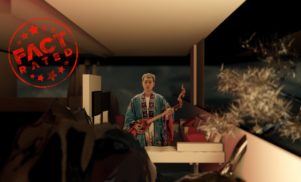FACT Rated is our series digging into the sounds and stories of the most vital breaking artists around right now. This week, Claire Lobenfeld talks to Beijing-born club innovator Howie Lee about 3D design, GarageBand’s Chinese instruments library and the possibility that we’re all just living in a simulation.
IN SHORT
NAME: Howie Lee
FROM: Beijing, China
MUST-HEAR: Homeless EP (2017, Do Hits)
FOR FANS OF: Aphex Twin, M.I.A., James Ferraro
Howie Lee thinks we might be living in the Matrix. Speaking from his home in Taipei, Taiwan, the Beijing-born club producer is waxing on the possibility that we’ve all just been imagined by someone else, either human or artificial. “I don’t know what to believe and I don’t know what is to value in this world anymore,” he says. “I’m always very anxious about what’s going to happen in the short future. I believe in the Matrix and I believe we might already be in it.”
Listening to his thrilling recent EP Homeless, one can hear the digital dread he describes, but its substance isn’t all future-fearing flourishes. When he speaks to FACT in June, he says he’s been digging a lot of old folk music from the Western border of China – sounds from Xinjiang, Tibet and Yunnan that meld Buddhist histories with Muslim traditions from China’s neighbors. This global influence from both the physical and digital worlds is imprinted all over the EP, which was named after the placelessness of the music.
Created with software like the granular synthesizer iPad app iDensity and popular entry-level DAW GarageBand – “most people delete it, but GarageBand has Chinese drum kit and erhu that’s really awesome” – as well as live instruments, the six-song collection is slaughtering club music made for our nearly-dystopian present. And if you can’t grasp the technicolor collage that its sounds invoke, Lee’s music videos deftly illustrate the world he is trying to sort out.
“I’m scared about real life, but the virtual life is more scary to me … when I play music, I feel safe.”
His visual identity is inspired by his wife, renowned designer Veeeky. “I’m inspired by a lot of cyberpunk things and I always think we’re already living in a dream and living in a sort of AI-controlled dream,” Lee says. “You have your own space, but you never really have space. Everything is in front of you like: BUY ME, CLICK ME.” He uses Cinema 4D and other 3D drafting tools to make his videos and other pieces of art. For a half decade, Lee has been incorporating these elements into his live show with Veeeky crafting the visual accompaniments to his music and another friend supplying a self-made game engine to the video art.
Lee is part of Do Hits, a label that originated in 2011 as a party at Beijing punk hangout School Bar before becoming fully-realized after moving to underground dance club Dada. But like Do Hits, Lee’s origins are also in punk. “I was in cheesy pop-punk like Green Day,” Lee says, looking back at his time as an audio engineering student a Communication University of China. “There were just a lot of show opportunities, but I had no idea why I was doing until I said, ‘OK, fuck this, this is boring, it’s not creative, these are cheesy pop songs.'” His roommate at the time taught him how to use Traktor and the two started DJing at bars together. But it was after university that dance music truly became his passion.
“When Justice came out and I was like, ‘OK, this is new music. It’s not punk, but it’s not the trance music that I used to listen to. It just grabbed my mind and I said, ‘I wanna do something like this.’” And like Justice, Lee’s brand of dance music is all about pushing the conversation forward. Throughout Homeless, there are multiple threads to latch onto in each track that transport its listener across varying musical landscapes. He’s created a kaleidoscopic world in order to grapple with what he sees as an easily manipulated reality. “I’m scared about real life, but the virtual life is more scary to me,” he says. “There is no way to get rid of the internet and it’s not necessary to, either. It’s more about self-control and not losing your awareness of yourself. When I play music, I feel safe.”
Claire Lobenfeld is on Twitter.
Read next: Iceland’s Bjarki makes 10 tracks a day and has Nina Kraviz on speed dial





























